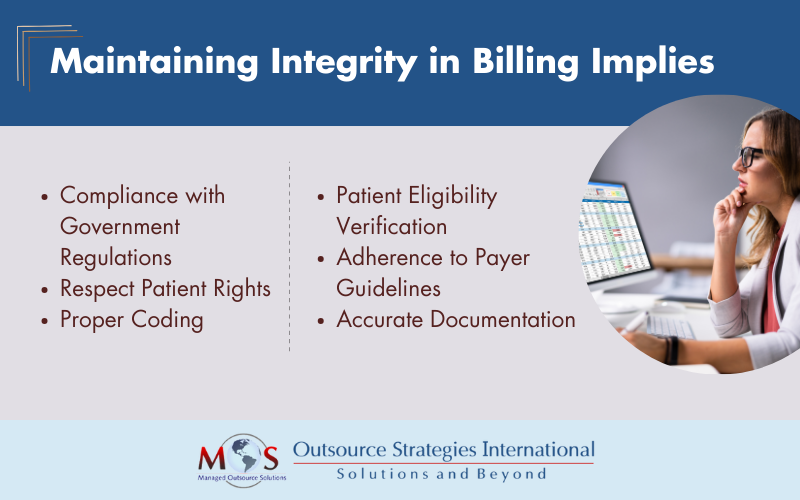In the world of medical billing, legality and ethics play a huge role. Whether you are a healthcare provider or a medical billing and coding specialist, it’s crucial to understand the legal and ethical aspects of medical billing. Fraud prevention in medical billing is not about numbers and codes – it’s about doing things in a professional way; think integrity, empathy, and top-notch performance. A professional medical billing company can provide dedicated support to help healthcare providers maintain ethics and professionalism and keep the system running smoothly. They always manually review the claims before submitting them to payers. This ensures that there is no duplicate billing or resultant fraud involved.

Fraud Prevention in Medical Billing
Medical billing and fraud can overlap in various ways within the healthcare system. Paying attention to the following legal and ethical considerations in medical billing is necessary to prevent fraud and abuse:
Compliance with Government Regulations in Medical Billing
Medical billing ethics requires having specific procedures in place to protect patient information. Healthcare providers should be familiar with the relevant healthcare regulations and billing guidelines, such as the Health Insurance Portability and Accountability Act (HIPAA) and the Centers for Medicare and Medicaid Services (CMS) guidelines. Adhering to HIPAA regulations is critical to protect patient confidentiality and ensure secure handling of sensitive medical information. Staying updated on any changes or updates to these regulations is essential to ensure accurate billing, prevent fraud, and avoid penalties or legal consequences.
Ensure Proper Coding
Follow the latest coding standards, like International Classification of Diseases (ICD) and Current Procedural Terminology (CPT) codes. Ensure codes precisely reflect the patient’s condition and the services rendered.
Proper coding is necessary to avoid medical billing fraud and abuse. According to CMS, the difference between fraud and abuse depends on specific facts, circumstances, intent, and knowledge. For avoiding any form of billing fraud or abuse, all medical services rendered should be accurately documented and billed using the correct CPT, ICD-10, and HCPCS codes.
Medical billing fraud is when a healthcare provider or individual submits false claims or makes misrepresentations of fact in order to receive greater reimbursement. Fraudulent billing practices related to medical codes include:
- Upcoding: Using a billing code for a more expensive service than provided. For instance, billing a comprehensive consultation for a brief check-up.
- Unbundling: Billing separately for services that should be grouped under one code, inflating costs. For example, billing each component of a surgical procedure individually.
- Misrepresentation of services: Billing for services not rendered, such as charging for tests ordered but not conducted.
- Duplicate billing: Charging multiple times for the same service, whether intentional or due to billing errors, for example billing both insurance and the patient for identical services.
A reliable medical billing company can easily identify any consistent high-level coding in the provider’s documentation. Upcoding is a major concern because it could trigger an audit and related hassles. Providers can partner with experienced medical billing companies that make sure that the medical codes are based on the actual documentation provided and not coded higher to maximize reimbursement.

Medical billing abuse includes any practice that does not provide patients with medically necessary services or meet professionally recognized standards of care. Examples of medical billing abuse include:
- Balance billing: Charging patients for the difference between what the healthcare provider bills and what the insurance company pays, often resulting in unexpected and inflated costs for patients. This happens when a patient receives treatment from an out-of-network provider who bills the patient for the maximum allowable charges – which are often much higher than the maximum allowable charges for the same treatment in-network.
- Waiving co-pays or deductibles: Waiving required patient payments (co-pays or deductibles) to encourage patients to seek care – this violates insurance agreements and leads to inaccurate billing.
- Billing medically unnecessary items or services for patients: This involves billing for services or items that aren’t required for a patient’s care.
- Charging excessively for services or supplies: Charging more than the reasonable or customary cost for services or supplies, especially if it’s done intentionally to overbill.
Addressing medical billing abuse is crucial to maintain transparency, ethical standards, and financial integrity within the healthcare system. Regulatory bodies, medical billing companies, auditing processes, and ethical guidelines play a vital role in preventing and rectifying instances of medical billing abuse to protect patients, insurers, and maintain trust within the healthcare industry.
Maintain Accurate Documentation
Maintaining accurate documentation is a critical consideration in medical billing. Providers need to maintain detailed records of patient encounters, diagnoses, procedures performed, and treatments rendered. Accurate documentation that complies with healthcare regulations and billing standards helps in adhering to coding guidelines and prevents potential legal issues related to incorrect billing. Medical documentation should be complete, legible and reflect the services rendered. It supports the services rendered and diagnoses provided, facilitating fair and appropriate reimbursement for healthcare services.
Verify Insurance Coverage
Verifying insurance coverage is an ethical responsibility in medical billing for several reasons. It informs patients about coverage, costs, and limitations beforehand, building trust and averting surprises. It accurately assesses covered services, preventing unfair billing. Providers must check eligibility beforehand, confirm coverage for procedures, and inform patients about potential uncovered services for alternative payment options.
Adhere to Payer Guidelines and Policies
One of the legal considerations in medical billing involves compliance with insurance company guidelines and policies. This includes accurately following the specific protocols, rules, and procedures set forth by insurance companies when submitting claims and processing billing information. Adherence ensures proper reimbursement and helps prevent potential disputes or legal issues related to billing practices.
Respect Patient Rights
Ethical billing practices respect patient rights. Patients have the right to access their medical records and understand the billing process associated with their healthcare services. Proper billing practices align with patient rights, ensuring transparency, accuracy, and fair treatment throughout the billing process. Patients’ rights should be respected and upheld throughout all aspects of medical billing to maintain trust and fairness in the healthcare system
By implementing these ethical billing practices and complying with industry regulations, healthcare providers can safeguard against medical fraud and abuse, ensure accurate billing, and maintain the trust and confidence of their patients.






